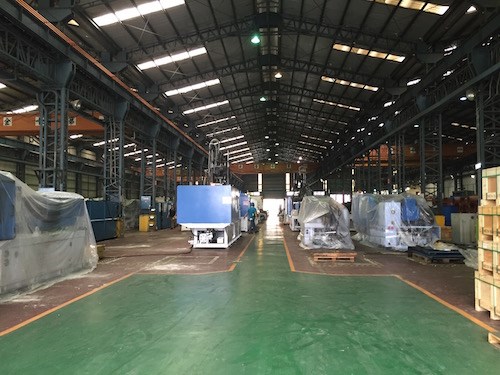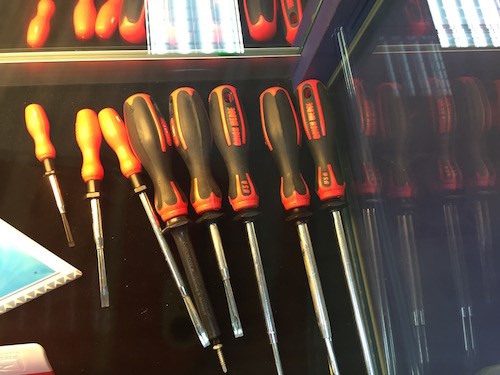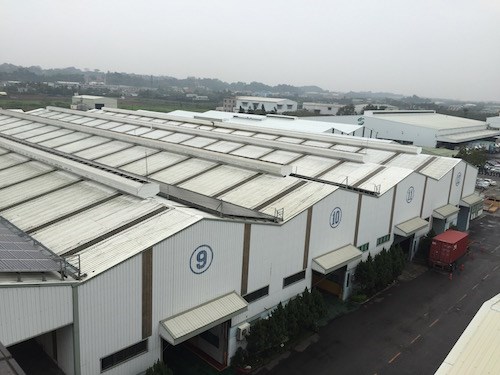Taiwanese Machinery Industry Making its Mark on the Global Stage
While Taiwan is small—for perspective Texas is nearly 20 times the island nation’s size—the country is invested in becoming a big player in plastics machinery.
While Taiwan is small—for perspective Texas is nearly 20 times the island nation’s size—the country is invested in becoming a big player in plastics machinery.
According to the Taiwan External Trade Development Council (TAITRA), Taiwan is among the world’s top six producers of plastics and rubber machines with a production value of $1.533 billion in 2014.
Importers and exporters of plastic machines and materials will head to Taipei in August for the biennial Taipei Plas, which will have its 15th edition this August (Aug. 12-16; Taipei Nangang Exhibition Center).
In March, Plastics Technology took part in a media tour of machinery suppliers as part of a pre-Taipei Plas trip organized by TAITRA. One of the more interesting tour stops was Fu Chun Shin Machinery Manufacture Co. Ltd., (FCS; Tainan, Taiwan), the largest injection molding machine manufacturer in Taiwan. It has three service centers—Taipei, Taichung, and Tainan—and it produces a wide range of injection molding machine models, covering clamping forces from 30 to 3,700 tons. The company has a goal to rank as one of the top 10 largest manufacturers of injection molding machines in the world by 2020. David Chen, executive director of FCS, said that the company fully realizes that cracking that top 10 would be no small feat.

One way the company seeks to achieve this goal is furthering partnerships. For instance, FCS is working with the MuCell microcellular molding process from Trexel Inc., Woburn Mass., on a thermoplastic automotive part. The company also has a partnership with a company in Europe on a machine that it will assemble in Taiwan and ship to Europe. In addition, FCS also just received approval from the Taiwanese government to set up a R&D center in Taiwan. All of these are cited as steps that will help the company reach top 10 status.
During Taipei Plas 2016, FCS will launch a new design of its multi-functional two-component injection molding machine, a two-platen hybrid injection machine and a 300-ton all-electric injection machine.
At Taipei Plas 2014, FCS displayed its horizontal rotary table two-component injection molding machine, which targeted large automotive parts and household electric appliance covers. This year, FCS is going to introduce a new design patent on its HB-350 RV injection molding machine. Using the VENT molding technology from Nihon Yuki Co., Japan, FCS says that the pre-heating and drying of plastic material “would not be necessary anymore.”
At Taipei Plas 2016, FCS will show that the 350-ton machine can cover the same mold loading capacity as a traditional 1,000-ton two-component injection machine. The company says that having only two platens and the horizontal turntable for its clamping unit saves space as well as makes it capable of producing single- and dual-component products. FCS says that it could satisfy the demand for products that use large two component molds (pictured below: 2-K parts molded on FCS machines for a U.S. customer).

FCS first introduced its two-platen hybrid eclectic molding system in 2006. It featured clamping force of up to 3,200-tons and more than 60 of the systems have been sold. This year during the exhibition, the company will show an updated design for this system, which the company claims offers performance that’s “running neck and neck with European brands.” The press reportedly retains the advantages of the opening-mold speed but also adopts an all-electric injection unit to help to shorten the molding cycle time.
Also at Taipei Plas, the new 300-ton all-electric machine will debut. It features a Keba AG, Linz Austria, controller and a servomotor from Phase in Genova, Italy. FCS says that the 300-ton machine has the same mold loading capacity as a 400-ton injection machine. The company is planning to develop a bigger tonnage model (up to 450-tons) to cover the demand for larger products.
Another company on the tour had the stated goal of top 10 status, expect this time on the extrusion side. Fong Kee International Machinery (FKI) in Tainan City, Taiwan. FKI manufactures a variety of plastic extrusion machinery including blow molding and blown film lines and exports to more than 110 countries, with 81% of sales coming from overseas sales.
Also on the tour, Chen Hsong Holding Limited, which produces around 15,000 machines annually, with customers in more than 80 countries and presses with a clamp force range from 20 to 6,500 tons. The company’s headquarters are in Hong Kong, but it has set up its main manufacturing and R&D centers in Shenzhen, China and Taoyuan, Taiwan.
Company representatives shared some recent highlights, including the delivery of a Chinese made 4,500-ton, servo-driven, two-platen injection molding machine to Europe. In 2014, it shipped a 6,500-ton servo-driven two-platen injection molding machine to Israel. According to the company, these large machines broke records for the largest tonnage molding machine made in China and exported abroad.
(Pictured: An aerial shot of FCS's facility in Tainan, Taiwan)

Read Next
Lead the Conversation, Change the Conversation
Coverage of single-use plastics can be both misleading and demoralizing. Here are 10 tips for changing the perception of the plastics industry at your company and in your community.
Read MorePeople 4.0 – How to Get Buy-In from Your Staff for Industry 4.0 Systems
Implementing a production monitoring system as the foundation of a ‘smart factory’ is about integrating people with new technology as much as it is about integrating machines and computers. Here are tips from a company that has gone through the process.
Read More









.png;maxWidth=300;quality=90)










